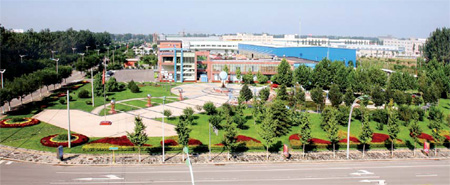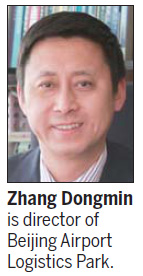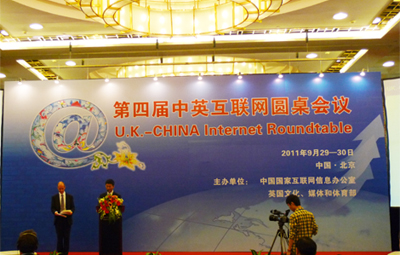Park's global vision
Updated: 2011-10-07 11:49
By Hu Haiyan (China Daily European)
|
|||||||||
|
 [Beijing Airport Logistics Park, which is home to 85 firms, has attracted foreign investment of $307 million in the past five years.] Provided to China Daily |
Logistics hub adds impetus to Shunyi's global plans
Much as Shunyi is positioning itself to be one of the best places to live and study in, it is also emerging as a major logistics hub thanks to its close proximity to one of the largest airports in the world.
As one of three New Districts in Beijing, Shunyi is not only an airport economic zone but also a major international exchange center.
Proximity to an airport or seaport along with excellent rail and road transport linkages are often the main requirements for a booming logistics industry.
Shunyi is within striking distance of Beijing Capital International Airport and just 160 kilometers away from the seaport of Tianjin. It is also well connected to the major rail and road transport networks.
Giving shape to the district's logistics dreams is the 1.55 square kilometer Beijing Airport Logistics Park, up near the northern end of the second runway at the airport, and the Bonded Logistics Center, cofounded by the park and Capital Airports Holding Co (CAH).
Established in July 2002 as one of the three main logistics parks under the Beijing Commercial Logistics Plan for 2002-2010, the park is also an important air cargo transport hub in North China and Asia.
The park has also been a major draw for foreign investment in Shunyi and has bolstered the district's gross domestic product.
Last year Shunyi reported GDP of 86.79 billion yuan ($13.6 billion, 10.3 billion euros), with an average annual growth rate of 27.6 percent, with logistics, finance and tourism accounting for nearly 60 percent of the growth.
But the main draw of the logistics hub is that it helps transport cargo seamlessly and effortlessly across the globe without any major procedural and red tape delays.
"The proximity to the airport helps the park perform a series of functions, including collecting and distributing commodities, processing goods, quality checks and other information services," says Zhang Dongmin, director of the logistics park.

"The park is the first of its kind in a Chinese airport and helps offer seamless integration between the bonded logistics center and the airport's cargo terminals and runways. This not only caters to the customer needs but also gives us great geographic advantages."
During the 11th Five Year Plan (2005-2010), the park had foreign investment to the tune of $307 million (229 million euros).
Between January and June this year the park handled nearly 519,000 tons of cargo and earned logistics revenue in excess of 1.77 billion yuan ($277 million, 211 million euros).
"By the end of the 12th Five-Year Plan (2011-2015), the cumulative fiscal revenue of the logistics park will be somewhere in the vicinity of 5.23 billion yuan, double that of the 11th Five-Year Plan period, and an annual growth rate of 10 percent," Zhang says.
The park is targeting foreign investment of over $500 million during the 12th Five-Year Plan, Zhang says.
The park is now home to more than 85 logistics companies, including 27 global majors like the Netherlands-based TNT.
Between 2009 and August 2011, TNT China invested $97.5 million to set up logistics facilities at the park and improve railway transport network delivery efficiency.
Liu Xiaoli, general manager of the northern branch of SF Express, a Chinese logistics company, says that for domestic companies the main draw, apart from location, is the presence of an established industry chain.
"The established presence of global companies like TNT and Capital Airport Group has been a strong foundation for domestic companies too," Liu says.
"What's more, the expansion of the airport and the logistics park also provides a suitable investment and operation environment for logistics companies."
Beijing Capital International Airport, which has the largest passenger traffic in China and the second largest in the world, has been expanding its facilities continuously since the 1980s, the last such exercise being undertaken in March 2004.
At the end of 2004, CAH, which is the largest shareholder of the Beijing airport, formed a joint venture with the logistics park to develop and manage the Bonded Logistics Center.
According to Wang Gang, head of Shunyi district, the key function of the center is to provide "one-stop customs clearance" for companies doing international trade.
Wang says that before the center was set up, due to complicated customs clearance procedures and labor inefficiencies, cargo from North China had to be shipped via Hong Kong to destinations such as Japan, thereby delaying the entire shipment process.
With the one-stop system, goods can be transported efficiently by reducing red tape and establishing effective coordination among all international trade related agencies on customs, quarantine, transport, warehousing, financial services and insurance procedures.
"By offering one-stop customs clearance, the center improves customs clearance efficiency and helps companies reduce the costs of doing international trade. Shunyi's international trade has also been boosted," Wang says.
"The improvement means a lot to companies in the international cargo transport business," says Zeng Xu, an aviation analyst with the Fuzhou-based Industrial Securities.
"Through more efficient cargo transport systems, the companies can provide all-round supply chain services and expand their business operations," Wang Gang says.
"The center has played a very significant role in improving North China's airport cargo transport industry. It is no exaggeration to say that it has helped the Beijing airport become one of the best air cargo transportation centers in Asia."










